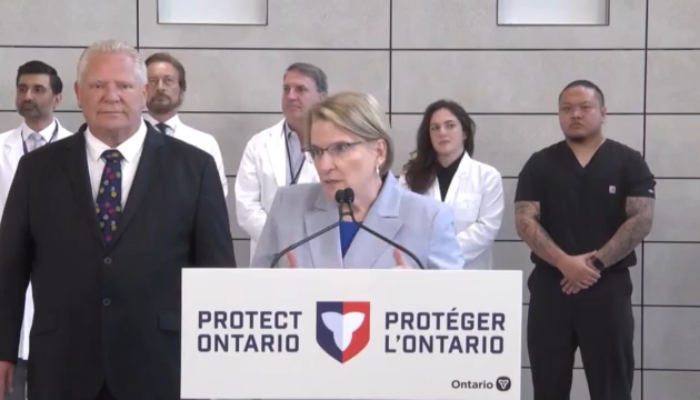As I walked through Queen’s Park yesterday, the mood was tense. A data breach affecting thousands of Ontarians’ health records has transformed from an IT incident into a full-blown political controversy that crosses party lines.
NDP MPP France Gélinas stood firmly at the podium, demanding answers about what she described as “a catastrophic failure to protect Ontarians’ most sensitive information.” The Health critic’s frustration was palpable as she called for accountability following revelations that hackers had accessed personal health data through a third-party vendor contracted by Ontario Health.
“People trust our healthcare system with their deepest secrets – their mental health struggles, addiction issues, family planning decisions,” Gélinas told reporters. “That trust has been violated, and the government owes Ontarians an explanation beyond technical jargon and corporate speak.”
The breach, which reportedly affected approximately 24,000 patients, exposed names, health card numbers, and in some cases, detailed medical histories. Sources close to the investigation suggest the compromised vendor had been flagged for security vulnerabilities in an audit conducted last year.
What makes this situation particularly troubling is the timeline. According to documents obtained through Freedom of Information requests, Ontario Health became aware of suspicious activity on their systems nearly three weeks before affected patients were notified.
Health Minister Sylvia Jones responded to questions in the legislature with assurances that an investigation is ongoing. “We take Ontarians’ privacy extremely seriously,” Jones stated. “Our government has engaged cybersecurity experts and is cooperating fully with the Information and Privacy Commissioner’s investigation.”
But for many patients like Mississauga resident Elena Kovacs, these assurances ring hollow. “I found out my mental health records might have been exposed from a form letter,” Kovacs told me after a community meeting in her riding. “No phone call, no real explanation about what happened or what I should do to protect myself.”
The political dimensions of this breach extend beyond partisan squabbles. The Ontario Privacy Commissioner has launched a formal investigation, while health advocacy groups question the province’s reliance on private contractors for handling sensitive health information.
Dr. Michael Rachlis, a public health physician and policy analyst, sees a deeper issue at play. “This isn’t just about one security failure,” he explained during our phone conversation. “It’s about accountability in a health system that increasingly outsources critical functions to private companies without adequate oversight.”
Data from Ontario’s Auditor General reveals spending on third-party IT vendors by the health ministry has increased 32% over the past four years, while investments in internal security infrastructure have remained relatively flat.
At town halls across the GTA, affected patients have expressed confusion about next steps. Many report receiving contradictory information about whether they should change health card numbers or monitor for identity theft.
Progressive Conservative MPP Robin Martin, parliamentary assistant to the Health Minister, defended the government’s response at a healthcare funding announcement in Etobicoke. “We’re taking concrete steps to strengthen our systems and support affected individuals,” Martin said, pointing to a newly established help line and credit monitoring services being offered to breach victims.
However, cybersecurity experts question whether these measures address the root issues. “Credit monitoring is closing the barn door after the horses have escaped,” said Ritesh Kotak, a Toronto-based cybersecurity consultant I spoke with yesterday. “The real question is how this vendor was cleared to handle sensitive health data despite documented security concerns.”
The Ontario Medical Association has called for a comprehensive review of data handling practices across the health system. “Physicians need to know their patients’ information is secure,” said OMA President Dr. Andrew Park in a statement released Tuesday.
In the halls of Queen’s Park, this breach has ignited a broader debate about privatization in healthcare. Opposition critics argue the incident demonstrates the risks of outsourcing critical health services without rigorous oversight.
Meanwhile, affected Ontarians like Brampton resident Jaswinder Singh wait for answers. “I keep hearing about investigations and reviews,” Singh told me at a community center in his neighborhood. “But nobody can tell me who has my information or what they might do with it. That’s what keeps me up at night.”
As this story develops, one thing remains clear: in our increasingly digital healthcare system, data security isn’t just an IT issue—it’s a matter of public trust. And for the thousands of Ontarians whose private health information has been compromised, that trust will not be easily restored.
The government has promised a full report within 30 days, but questions linger about whether this breach will prompt meaningful changes to how our health data is managed, protected, and valued in Ontario.






